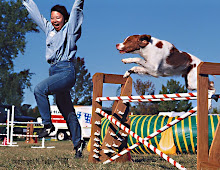In a past post, I discussed coprophagia in dogs.
Dr. Ben Hart, a board-certified veterinary behaviorist from UC Davis, did a study using internet surveys regarding this subject, and the results and conclusions were presented at the AVSAB annual meeting in 2012. He learned that as many as 16% of dogs ate stools frequently. 85% of these dogs at the feces of other dogs. Intact males were less likely to eat feces than neutered males or females (spayed or not). Diet did not influence this habit, so dogs are not likely to be eating feces to gain something that they are lacking nutritionally. 40% of Border Collies and Shetland Sheepdogs ate feces; no Poodles were reported to do so. Interestingly, 90% of the stools were eaten within 2 days of deposition.
Dr. Hart's conclusion from this study was that since dogs eat the stools of other dogs while they were relatively fresh, that coprophagia may have been a selected-for behavior because it provides a way to keep the den clean and protect puppies from intestinal parasites, which would not yet have matured to be at an infective stage.
Dr. Hart's study also found that deterrents (such as For-Bid, Deter-um, etc.) and food additives (pineapple, meat tenderizer) were effective only 0-2% of the time to prevent coprophagia. Neither punishment (yelling, electronic collars) nor reward based traning methods (clicker traning) were effective. The best solution was to pick up the dog promptly after it is deposited... or, perhaps, as Dr. Hart jokes, get an intact, male Poodle.
My primary objective is to help pets and owners enjoy a more satisfying relationship with each other and maintaining the pet’s health to maintain the pet’s quality of life. Pets have the ability to enrich our lives immensely, and I feel that owners also have a responsibility to enrich their pets’ lives, too.
Got a pet behavior question?
E-mail me at fah@fairmountanimal.com.
